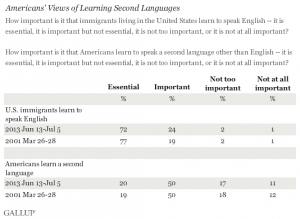After spending a week in Shanghai, I have found that it is possible to live here and only know a few key Chinese phrases. The Metro has English transitions, restaurants have picture menus, and many people in the service industry know some English. While it can be difficult at times, we are able to get around the city without knowing Chinese. At some points in times, I have felt like I have been charged more for an item, but since I cannot speak the language, I have no alternative. That has been one of the few practical downsides of not knowing Chinese. For the most part, the Chinese have been extremely receptive to us and have been overly polite in our exchanges. The students all seem to have a background in English and can communicate with us, which is impressive to say the least. Furthermore, it shows that it is going to get easier to only know English and live in Shanghai.
However, should we not learn Chinese or other foreign languages just because we can get by without them? I recently read a really interesting blog in The Huffington Post titled “Cheating the Chinese,” which focused on Western businessmen in China who did not learn Mandarin. In quick summary, it critiqued the businessmen who complain about being cheated by the Chinese for not knowing Mandarin, and essentially blamed them for the issue. Chinese business leaders know English, so by not knowing Mandarin, American businessmen and businesswomen put themselves at a disadvantage. Just getting by without speaking multiple languages is not sufficient. Americans must push ourselves outside of our comfort zone and become globally competitive in language acquisition. As globalization increases, monolingual people will be left behind, and we must promote foreign language acquisition in the United States. Gallup conducted a poll of American attitudes toward immigrants learning English, and Americans learning a second language. The results are shown below:

The difference in responses to the two somewhat similar questions is glaring. To the at least 52% of Americans that deemed it essential for immigrants to learn English but not essential for themselves to learn a second language, what enables this attitude? I will attempt to answer it, but I must admit that I myself am curious. At face value, a critical difference between the two questions is that in one case, an immigrant chose to come to the United States. Some might argue that this decision creates an obligation for the individual to learn English, and that is the separating point.
While this might sound fair, it does not describe the entire situation. The United States forces assimilation, and many immigrants make their children learn English. In addition, they sometimes even focus on making sure their children do not learn their language of heritage in order that they can seem more American. We have created a culture that forces people to learn our language and judges them if they sound different. We have in many ways diverted away from our founding as immigrants. As a melting pot, we should not preach assimilation into one; instead, we should allow our differences to exist and look for other connecting points. Furthermore, we are rejecting globalization by not becoming a multilingual nation, and as such, we are stagnating our future as potential leaders in the global system.
Coming back to the Chinese example, learning the language is essential to understanding the culture. Language provides a cornerstone of understanding different cultures, and if we really want to understand the Eastern world, we must study all aspects including language. How can we hope to understand a country without knowing how they communicate with each other? For example, the Sapir-Whorf hypothesis suggests that language has profound effect on how people think, and in some cases, it constrains the way a person perceives the world. In this model, foreign language acquisition would ease some of those constraints and allow for a better understanding of culture.
Nelson Mandela said, “If you talk to a man in a language he understands, that goes to his head. If you talk to him in his own language, that goes to his heart.” Language is powerful, and there is more to the world than just English. The American strategy of late has seemed to try and integrate English into as many countries as possible and make English the official global business language. Other countries have responded by making national strides in learning foreign languages, which is allowing easier integration of their workers into the global economy. We must recognize that learning foreign languages is necessary, and we are putting ourselves at a major disadvantage in the marketplace.
My suggested solution would be to increase People to People travel programs in high school and university study in order to give young Americans the opportunity to use the language they are learning. In addition to trips, partnering with other countries to have virtual penpals for students that effectively uses Skype or Google Hangout to allow for language practice. Essentially, these programs would broaden American students’ mindsets and help them see a purpose for language acquisition. Finally, a core piece to the solution is for more states to mandate foreign language study in high schools. As of 2010, only 10 states mandated foreign language learning in high school, which helps maintain the abysmal statistic of only one in four Americans knowing more than one language. While the United States is the global economic leader, Americans must also do their part to maintain this status.
Philip Moore








